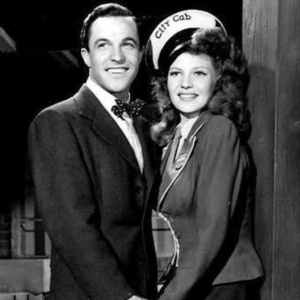Gene and Rita

Rita Hayworth (born Margarita Carmen Cansino; October 17, 1918 – May 14, 1987) was an American actress and dancer. She achieved fame during the 1940s as one of the era's top stars, appearing in 61 films over 37 years. The press coined the term "The Love Goddess" to describe Hayworth after she had become the most glamorous screen idol of the 1940s. She was the top pin-up girl for GIsduring World War II.[1]
Hayworth is perhaps best known for her performance in the 1946 film noir Gilda, opposite Glenn Ford, in which she played the femme fatale in her first major dramatic role. Fred Astaire, with whom she made two films, once called her his favorite dance partner. Her greatest success was in the Technicolor musical Cover Girl (1944), with Gene Kelly. She is listed as one of the top 25 female motion picture stars of all time in the American Film Institute's survey, AFI's 100 Years...100 Stars.
In 1980, Hayworth was diagnosed with Alzheimer's disease, which contributed to her death at age 68. The public disclosure and discussion of her illness drew attention to Alzheimer's, which was largely unknown by most people at the time, and helped to increase public and private funding for Alzheimer's research. (Source: https://en.wikipedia.org/wiki/Rita_Hayworth)
Eugene Curran Kelly (August 23, 1912 – February 2, 1996) was an American-Irish dancer, actor of film, stage, and television, singer, film director, producer, screenwriter, comedian and choreographer. He was known for his energetic and athletic dancing style, his good looks, and the likable characters that he played on screen.
Best known today for his performances in films such as On the Town (1949), An American in Paris (1951), Anchors Aweigh (1945)— for which he was nominated for the Academy Award for Best Actor—and Singin' in the Rain (1952), he starred in musical films until they fell out of fashion in the late 1950s. He starred in, choreographed, or co-directed some of the most well-regarded musicals of the 1940s and 1950s, debuting with Judy Garland in For Me and My Gal (1942), and followed by Du Barry Was a Lady (1943), Thousands Cheer(1943), The Pirate (1948), and It's Always Fair Weather (1955), among others. Later, he starred in two films outside the musical genre: Inherit the Wind (1960) and What a Way to Go! (1964).[2] Kelly directed films without a collaborator (in some of which he starred), including Hello, Dolly! (1969),[3][4][5] which was nominated for the Academy Award for Best Picture.[6][7]
His many innovations transformed the Hollywood musical, and he is credited with almost single-handedly making the ballet form commercially acceptable to film audiences.[8] Kelly received an Academy Honorary Award in 1952 for his career achievements, the same year An American in Paris won six Academy Awards, including Best Picture. He later received lifetime achievement awards in the Kennedy Center Honors (1982) and from the Screen Actors Guild and American Film Institute. In 1999, the American Film Institute also ranked him as the 15th greatest male screen legend of Classic Hollywood Cinema. (Source: https://en.wikipedia.org/wiki/Gene_Kelly)
Click the button to vote for Gene and Rita!


